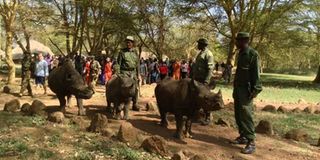Community involvement, not punitive laws, best anti-poaching war, says study

Baby rhinos at the Lewa Conservancy. A new study shows that community involvement is key to tackling wildlife related crimes. PHOTO | JAMES NGUNJIRI | NATION MEDIA GROUP
What you need to know:
- This is according to a study titled ‘Conservation, Crime and Communities’ by the International Institute for Environment and Development.
- The study found that involving communities living next to the sanctuaries was the most efficient way to protect wildlife and its habitat.
- IIED said that enabling communities to take charge of wildlife conservation through establishment of community-run conservancies helps to endear the community to wildlife conservation ventures.
- In northern Kenya, communities were trained on self-management strategies that saw women form silk harvesting and bead making teams which were later exported to Europe and America for sale.
Community involvement in pro-wildlife activities is more effective in winning the anti-poaching war than enactment of punitive wildlife laws coupled with international campaign to ‘kill’ game trophy markets.
This is according to a study titled ‘Conservation, Crime and Communities’ by the International Institute for Environment and Development (IIED) that looked at eleven wildlife conservancies, three of them in Kenya.
The study found that involving communities living next to the sanctuaries was the most efficient way to protect wildlife and its habitat.
IIED said that enabling communities to take charge of wildlife conservation through establishment of community-run conservancies where livestock keeping is an integral part as well as communal tourist bandas helps to endear the community to wildlife conservation ventures.
“The survival of some of the world’s most iconic wildlife species lies in the hands of the communities who live alongside them,” says IIED’s principal researcher Dr Dilys Roe.
The report observes that helping communities see conservation of the habitat through pasture rehabilitation and wildlife conservation as an income resource is a major incentive that could enable the mainly pastoralist communities to engage in wildlife conservation.
IIED researchers say that decision making on management of wildlife sanctuaries as pertaining to access has been more successful than forcing decisions from ‘outside’ that are imposed on the communities.
The Kenyan case studies, The Greater Kilimanjaro Landscape, Olderkesi Conservancy, adjacent to Maasai Mara National Reserve and 19 community conservancies covering 2.5 million hectares of community land show that proper engagement of local communities means easier propagation of wildlife and their habitat for better income for locals and the government.
ESTABLISHED LODGES AND CAMPS
The study says inculcating a new attitude towards wildlife as an economic venture among locals has helped nurture a new beginning where investors have signed commercial pacts with local management committees for the establishment of lodges and camps.
The agreement involves a commitment to employ locals as well as set aside a certain percentage of earnings from the venture for implementation of community driven projects such as schools, bursaries and water projects.
“Education and awareness about the threatened status of local animals can influence attitudes, change behaviour, and win support for conservation.
“This engagement should also consider views of local leadership so as to enhance common interests for the sake of conservation,” the study says.
The study said that incorporation of local traditional institutions where elders are involved in decision making had helped solve conflicts even in far flung areas where the justice system was hard to reach.
In northern Kenya, communities were trained on self-management strategies that saw women form silk harvesting and bead making teams which were later exported to Europe and America for sale.
Saving schemes were also established at the village level thereby enabling residents of remote villages get a chance to meet and discuss income generating ventures.





